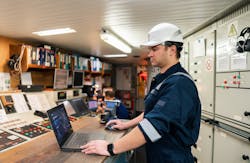Smart data management supporting greener offshore vessel fleets
Many offshore oil and gas companies still rely on paper and spreadsheets for the daily management of their support fleets. But without the insights provided by solid, well-interpreted data, it is hard to identify operational inefficiencies, let alone fix them.
For the offshore sector, the ability to optimize operations has never been more important. Energy companies and their supply chain partners must juggle with major fluctuations in oil prices and ever-slimmer operating margins, making it vital to reduce costs. In this context, fuel savings may make the difference between staying afloat or going under.
The industry also faces growing pressure to make its activities more sustainable. Sooner or later, this will be reflected in companies’ balance sheets, as sustainability is included as a criterion for lending and investing decisions, and for tenders along the supply chain.
Data can help the industry address the sustainability challenge by reducing the emissions generated by offshore support vessels.
The first step in any coherent decarbonization plan is to determine your starting point. Decision-makers need a comprehensive, evidence-based picture of their operations and energy efficiency. The latest technologies enable operators to collect a wealth of real-time data on the position of vessels, their operations, weather conditions, the fuel consumption of each engine, minute by minute. Opsealog’s performance management service Marinsights integrates and processes data from different sources, analyzing it to highlight the bigger trends, gaps, and areas for improvement.
The service can play a significant role in optimizing the daily operations of offshore support fleets; for example, by removing unnecessary journeys, reducing idle time, or ensuring that vessels are deployed in optimal times and weather conditions. In other words, it helps companies and their offshore and shore-based personnel make smarter choices with their assets. This can lead to substantial reductions in fuel consumption, cutting emissions in a way that is verifiable and measurable.
Across the global fleet of 470 vessels that the service tracks, the resulting changes in operational behavior alone have cut fuel consumption and emissions by 15%. Opsealog is confident that emissions can be lowered by another 10-15%, thanks to transformative changes in how it is collecting and analyzing data.
Data can deliver other insights that bring further reductions in fuel consumption and emissions, helped by two fundamental changes. Firstly, the company’s capacity to capture new types of data continues to grow. Digitized systems will progressively replace paper, whiteboards, and spreadsheets for much of the reporting that is still being done manually, including data on crews and safety. Moreover, data on engine load and temperature can be factored into our models, providing granular information to further optimize operations and reduce emissions.
The other fundamental change is that data can be collected automatically from vessel sensors, saving time and limiting the risk of error. For example, advances in connectivity are allowing the company to connect its systems to those onboard sensors and receive engine and navigation information in real time.
This increase in the scope, volume and quality of data represents a formidable opportunity. Throughout the company’s six years in existence, each new addition to the data supply has enabled us to increase our knowledge and improve models and algorithms. And by joining forces with various specialists in software, logistics, and IOT, Opsealog has been able to create a ‘data ecosystem’ for each client in which data is collected and analyzed seamlessly.
Increasingly, clients are setting ambitious goals for emissions reductions. Smart data will allow them to assess in advance the financial and logistical impacts of crucial decisions, such as the deployment of greener technologies and vessels, or the transition to alternative fuels. Analysis is tailored to highlight specific trends, depending on the desired outcome.
A recent trial on 11 vessels for ADNOC Logistics & Services delivered a 12% reduction in fuel consumption and emissions, representing 572 cu m (20,200 cu ft) of fuel and 1,519 metric tons (1,674 tons) of CO2. The Marinsights service has since been rolled out across ADNOC’s fleet of 70 vessels.
Clients are also keen to see how operations can be optimized in other areas of activity, such as offshore wind farms and oil and gas tankers. With a few adjustments, the algorithms work in these sectors. Given that shipping is responsible for nearly 3% of the world’s anthropogenic CO2 emissions, the volume of emissions that could be avoided through optimization measures is substantial.
